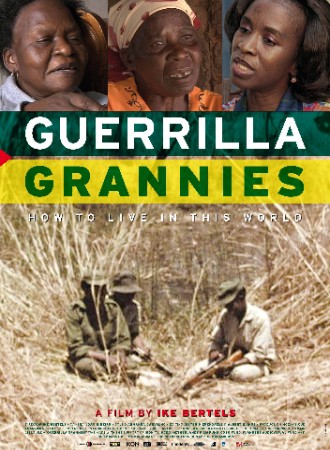
Guerilla Grannies: How to Live in this World 2012
Distributed by Icarus Films, 32 Court St., 21st Floor, Brooklyn, NY 11201; 800-876-1710
Produced by Ike Bertels
Directed by Ike Bertels
DVD, color, 85 min., Portuguese with English subtitles
College - General Adult
Activism, Africa, Women
Date Entered: 02/05/2014
Reviewed by Marie Letarte Mueller, Daniel Webster CollegeUnlike many films, the filmmaker is as much a part of this film as the three women featured: Guerilla Grannies Amelia, Monica & Maria.
Ike Bertels first saw these women in a BBC documentary when they were just girls, recruits in the Women’s Detachment of the Mozambique Liberation Front (FRELIMO) in the 1960s. To pursue her dream of meeting these women, she learned Portuguese and, in 1984, finally tracked them down and met them in Mozambique.
In 1984 they were no longer girls—they were women. When Ike showed them the film that had inspired her, the women reminisced about their time in FRELIMO and the other freedom fighters in the film—some of them long dead.
Ike Bertels returned in 1994 and again in the 21st century, each time talking with Monica, Amelia, Maria and their families. The film neatly weaves together footage from the BBC documentary and each of Bertels’ previous films, although the bulk of the story is in the present-day.
Amelia, an uneducated farm girl when she joined FRELIMO, joined the army at fifteen and left her one-year-old; when she returned (ten years later), he didn’t know who she was. During her time with the rebel fighters, she received some schooling, but has spent the rest of her time keeping her extended family together. Amelia took care of her mother, her children, and various nieces and nephews—making sure they were educated—as well as caring for her farm.
Monica left her home in 1963 to join the rebel armies in the bush. When she left home, she didn’t even know there was a road connecting the various places in Mozambique. She learned to read and write in the bush. When the war with the Portuguese was finally over, she was elected to the Central Committee in 1975. She spent much of her time on the Committee promoting equality between the sexes. The retired colonel currently lives in Maputo, trying to raise her grandson after her daughter died.
Maria—the victim of a stroke in 2004 and not available for filming—was highly educated when she joined FRELIMO with her husband. After the war for independence, she worked abroad, but returned to vote in the first free elections in 1994. Her son spoke of her keeping the family together before her stroke.
All three women sacrificed a lot—and lost family members—to bring freedom to their country. Their children don’t realize how much things have improved since the civil wars in the 1970s. The FRELIMO party enabled everyone to go to school.
Like many freedom fighters, Amelia, Monica, and Maria wanted a better life for themselves and their families. This movie makes the struggles in Mozambique personal and real. Not enough African history travels across the Atlantic Ocean, but this is a great start.